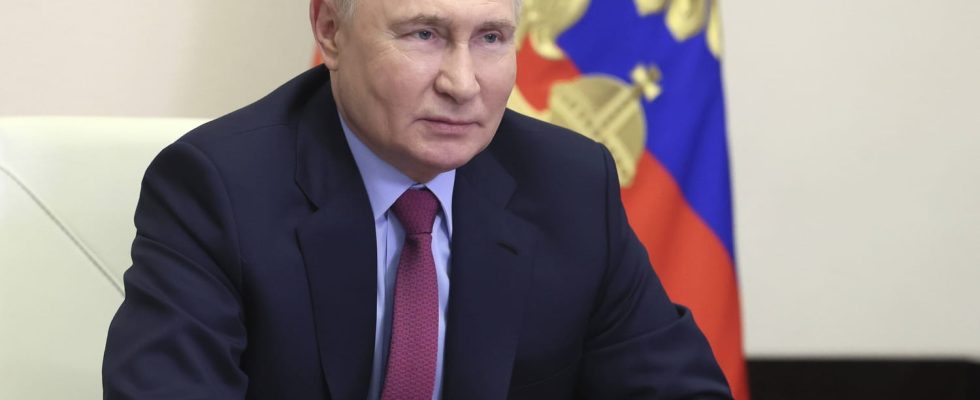Organized from Friday to Sunday, the Russian presidential election should see Vladimir Putin win with a very large majority of the votes and seek a fifth term. On the other hand, the absence of competing candidates raises the question of the legitimacy of the master of the Kremlin.
The Russian presidential election takes place from March 15 to 17, 2024. A little more than 114 million people are registered on the electoral lists and are called to vote. Candidate for his own succession, President Vladimir Putin should triumph this Sunday and exceed the score of 77% of the votes reached in 2018. If he were to win, the master of the Kremlin would begin his fifth term at the head of the Federation of Russia, the third in a row.
Assured of victory, Putin eyes triumph
If the outcome of the vote leaves little room for doubt, Vladimir Putin wants more than anything to push the population to vote to legitimize his score. The remote voting started on February 25 and ended this Thursday, March 14. The objective being to facilitate voting for the most remote areas of Russia, such as that of residents of annexed regions in Ukraine for whom mobile polling stations have been provided. Three candidates are also in the running to reach the highest summit in the state, and two others, truly opponents of the president in place, were excluded from the ballot recently.
The Russian presidential election does not arouse any particular enthusiasm. Firstly because Vladimir Putin is almost certain to be re-elected this Sunday. On the other hand, the latter needs a plebiscite to legitimize his regime. “A “personalist” political regime needs regular reconfirmation of the legitimacy and popularity of its leader. All-powerful Putin seeks the acclaim of the population and its elites. Especially since his system has displayed various flaws since the start of the invasion in Ukraine, both by the poor quality of the information provided by the various special services to the president, convinced of the possibility of taking Kiev in three days, and by the setbacks of the Russian army ” explains Tatiana Kastouéva-Jean, specialist in Russia, in an article in Le Monde.
What weight for the other three candidates?
The candidates running against Vladimir Putin do not present solid guarantees to worry the 71-year-old president. It is even difficult to describe them as “competitors” as their positions on the invasion of Ukraine are similar to those of the Russian government. The three candidates are all members of parties represented in the Russian Parliament, but did not even need to collect the necessary number of endorsements to run in the election. Their presence in front of Vladimir Putin simply gives the impression of a semblance of pluralism and contradiction.
The first, Nikolai Kharitonov, represents the Russian Communist Party. “Our task is to consolidate the people during the electoral campaign so that there is victory on all fronts” he indicated in December 2023. The second, Leonid Sloutsky, is the head of the Russian Liberal Democratic Party. Relatively close to Vladimir Putin, he has already promised that he would “not take away his voice”. Finally, Vladislav Davankov is the last candidate in the Russian presidential election. Member of Parliament and former candidate for mayor of Moscow, he is a fervent defender of the Russian offensive and the war in general: “Would I want peace at all costs? No” he said regarding Ukraine in the columns of Fontaka, a Russian media outlet. His party is regularly accused of being an opposition fabricated by the Kremlin.
Russian election commission rules out two serious candidates
Two credible opposition candidacies to Vladimir Putin had nevertheless been put in place in view of the election this March. Both were dismissed. Boris Nadejdine, liberal and pacifist candidate, notably saw his candidacy rejected by the Russian electoral commission. The number of verified and valid voter endorsements required is 100,000. Commission member Andrei Shutov invalidated 9,147 of his supporting signatures. Result of the races, the candidate only has 95,587 sponsorships. He was unable to run in this 2024 presidential election. Opposed to the war in Ukraine, he described Russia’s desire to create more territories as a “bad idea” to France Info.
The observation is the same for the journalist and former municipal elected official Ekaterina Dountsova. The Russian electoral commission invalidated her candidacy last December citing “errors in documents” provided by the candidate. Also opposed to the Russian offensive in Ukraine, she campaigns in particular for democracy. Add to this potential ballot stuffing, as in the 2021 legislative elections explains Freedom House, and you obtain an election whose legitimacy raises questions. This year, electronic voting could also increase the risk of fraud.
